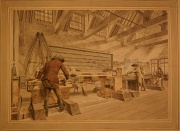Difference between revisions of "Jan Verbruggen"
| Line 2: | Line 2: | ||
1755 Verbruggen was appointed as gunfounder to the States of the Province of Holland, followed by | 1755 Verbruggen was appointed as gunfounder to the States of the Province of Holland, followed by | ||
his appointment as State gunfounder later in the same year. In the Hague he started the construction of a new [[Early Boring Mills|boring machine]] with help of Johan Jacob Siegler, who had been an employee of [[Johan Maritz]]. Verbruggen left his employment in 1770 and moved from to England to become the Master Gunfounder at [[Woolwich Arsenal]]. This move followed the discovery of extensive repairs to gun barrels, involving the insertion of numerous screws in areas of defective material at the bore. <ref>[http://www.napoleon-series.org/military/OrdnanceJournal/Issue6/SOJ-6-6_C18th_Gunfounding.pdf] Section 6: '18th Century Gunfounding ‘Screws’, or tricks of trade: secret repairs of solid cast cannon by Jan Verbruggen' By Dr. J.R. Verbeek, the Netherlands. A fascinating document</ref>. Reprehensible as the repairs were, the achievement in fitting the screws from within is remarkable. | his appointment as State gunfounder later in the same year. In the Hague he started the construction of a new [[Early Boring Mills|boring machine]] with help of Johan Jacob Siegler, who had been an employee of [[Johan Maritz]]. Verbruggen left his employment in 1770 and moved from to England to become the joint Master Gunfounder at [[Woolwich Arsenal]] with his son [[Pieter Verbruggen]]. This move followed the discovery of extensive repairs to gun barrels, involving the insertion of numerous screws in areas of defective material at the bore. <ref>[http://www.napoleon-series.org/military/OrdnanceJournal/Issue6/SOJ-6-6_C18th_Gunfounding.pdf] Section 6: '18th Century Gunfounding ‘Screws’, or tricks of trade: secret repairs of solid cast cannon by Jan Verbruggen' By Dr. J.R. Verbeek, the Netherlands. A fascinating document</ref>. Reprehensible as the repairs were, the achievement in fitting the screws from within is remarkable. | ||
At Woolwich he became known as John Verbruggen, and worked closely with his son | At Woolwich he became known as John Verbruggen, and worked closely with his son. Jan or Pieter produced a series of superb drawings and paintings which provide a remarkable record of the production of cannon, including turning and [[Early Boring Mills|boring]] using machines developed by Verbruggen. One of these is shown above, from Wikipedia, where higher resolution versions may be found<ref>[https://commons.wikimedia.org/wiki/File:Jan_Verbruggen_Foudary_Drawing_47_Horizontal_Boring_Machine.JPG] Wikipedia</ref>. | ||
== See Also == | == See Also == | ||
Latest revision as of 13:17, 16 February 2016

1755 Verbruggen was appointed as gunfounder to the States of the Province of Holland, followed by his appointment as State gunfounder later in the same year. In the Hague he started the construction of a new boring machine with help of Johan Jacob Siegler, who had been an employee of Johan Maritz. Verbruggen left his employment in 1770 and moved from to England to become the joint Master Gunfounder at Woolwich Arsenal with his son Pieter Verbruggen. This move followed the discovery of extensive repairs to gun barrels, involving the insertion of numerous screws in areas of defective material at the bore. [1]. Reprehensible as the repairs were, the achievement in fitting the screws from within is remarkable.
At Woolwich he became known as John Verbruggen, and worked closely with his son. Jan or Pieter produced a series of superb drawings and paintings which provide a remarkable record of the production of cannon, including turning and boring using machines developed by Verbruggen. One of these is shown above, from Wikipedia, where higher resolution versions may be found[2].

